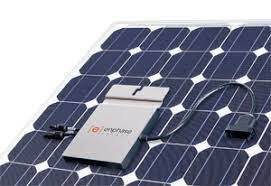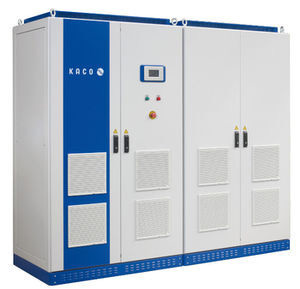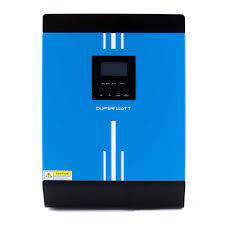What is a solar inverter?
Published on: 25/07/2022 · 3 min read

What is a solar inverter? And what is it for?
The solar inverter is the
brain of a photovoltaic installation, also
called regulator,
an inverter is used to transform the direct current produced by the
photovoltaic panels into an alternating current
suitable for the home's electrical network.
The inverter works continuously and analyses the changes in the level of production in order to adapt consumption; this device also has a microprocessor that ensures that the electric current respects the standards imposed by the network operator. The inverter is an important part of the photovoltaic installation as it allows the integration of batteries to your electricity production.
The inverter works continuously and analyses the changes in the level of production in order to adapt consumption; this device also has a microprocessor that ensures that the electric current respects the standards imposed by the network operator. The inverter is an important part of the photovoltaic installation as it allows the integration of batteries to your electricity production.
There are several types of solar inverters, the most used on the market are the following:
The Micro-Inverter
The micro-inverter or module inverter is the one
most often used for private homes, this
type of inverter is small and is
installed directlybehind each solar panel
to transform direct current into alternating current. The
advantage of this type of inverter is that
each panel is independent because it has its own inverter. However, this complicates repairs and other maintenance
operations because you have to go on the roof to control each
inverter.

The Central Inverter

This type of inverter receives and
transforms the electricity supplied by several solar panels at
the same time, this inverter is large and can handle several strings of
panels.
The installation of this type of inverter is privileged when the park of solar panels is important. This inverter takes the form of a ground-mounted cabinet. It is particularly suitable for professional and industrial premises. However, the price of this type of inverter is relatively high.
The installation of this type of inverter is privileged when the park of solar panels is important. This inverter takes the form of a ground-mounted cabinet. It is particularly suitable for professional and industrial premises. However, the price of this type of inverter is relatively high.
The Hybrid Inverter
This is the
latest generation of inverters; these
hybrid inverters are intelligent.
Depending on the settings, the
inverter will determine itself whether
the electricity produced is to be used immediately, stored in a
battery, or fed into the grid.
The hybrid inverter can manage different energy sources and alternate the consumption according to the production context. This type of inverter is advantageous because it allows for better monitoring of your installations. Nevertheless, it is an expensive piece of equipment
The hybrid inverter can manage different energy sources and alternate the consumption according to the production context. This type of inverter is advantageous because it allows for better monitoring of your installations. Nevertheless, it is an expensive piece of equipment

Listen to our customers
Create sustainable
energy together
energy together